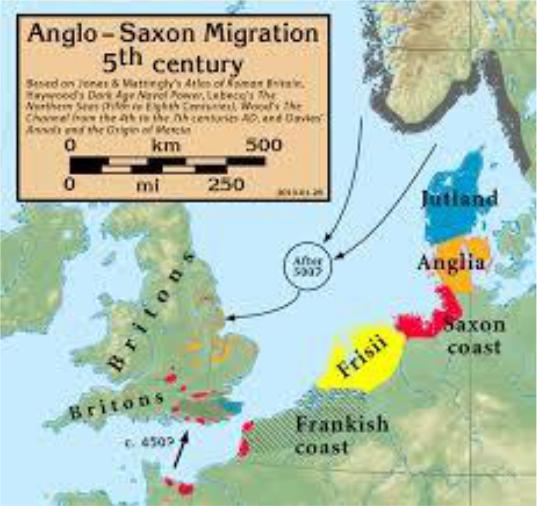
1. Ancient Britain
.pdfLegions Leave Britain…
The Roman legions began to leave Britain at the end of the 4th century.
The famous letter of AD
410 from the Emperor Honorius told the cities of Britain to look to their own defences from that time on.

… to German Tribes
The Dark Ages
The 5th -6th centuries - Sub-Roman Britain, or the "Dark Ages", the period when the country was swept over by
Saxons, Angles and Jutes, settlers from southern Denmark.
In 449 Hengist and Horsa, the tribal leaders, founded the Jutish kingdom of
Kent.

Folklore and Tradition:
King Arthur
King Arthur is believed to be a British warlord of 5th6th centuries, who led the defence of Britain against Saxon invaders in the early 6th century.

Seven Kingdoms
From the 6th century 7 larger distinctive kingdoms are developing, still known to some as the Heptarchy:
Northumbria, Mercia, Kent, East Anglia, Essex, Sussex and Wessex.
Wessex Gains Power
The so-called 'Mercian Supremacy' dominated the 8th century, though again was not constant. Aethelbald and Offa, the two most powerful kings, achieved high status. However, a rising Wessex ended the 'Mercian Supremacy‘.

The 1st Great King
The West Saxon kings came by 899 to rule Wessex, Sussex and Kent. Alfred deserves his title –
‘the Great’: he reorganised the army, made great efforts in ship-building; population of Celtic, British and Norse origin was
equal in rights in his realm.
He created a system of laws, actually the customary law of shires, encouraged religion and learning.
Danegeld
Alfred’s grandson, Athelstan, was the first king to achieve direct rulership of what we now consider 'England'. He defeated a combined Scottish-Viking army at the Battle of Brunanburh.
Under Athelstan's successors the kingdom broke up and was reformed numerous times. Aethelred the Reedless (Ill Advice) was to blame for a shameful period in history of England – Danegeld – because he bought truce with the Norsemen for the

A Bit of Language History
Norse and Danish settlement left significant traces in the English language; many fundamental words in modern English are derived from Old Norse, e.g. sky, hill, calf, leg, roof, window, awkward, low, glitter, scare, take; and, a unique case – pronouns their and them.
Struggle for Power
The end of the 10th century saw renewed Scandinavian interest in England. Rule over England fluctuated between the descendants of English Aethelred and the Danish king Canute for the first half of the 11th century. Ultimately this resulted in the situation of 1066, where several people had a claim to the English throne.
